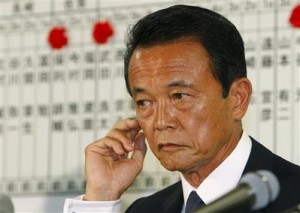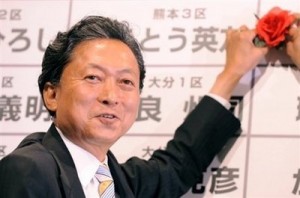Imagine the state of affairs in the UK if the Conservative Party – with its focus on business and increasing the wealth of the “haves” – had been in power for past 54 years. Then imagine the electoral revolution if the perennially hapless Labour Party – with its focus on welfare and reducing the plight of the “have nots” – finally ousted the Conservatives in a landslide.
 Well, this is precisely what happened in Japan yesterday. Specifically, the perennially hapless Democratic Party of Japan (DPJ) handed the seemingly invincible Liberal Democratic Party (LDP) a devastating defeat in national elections, winning 300 of the 480 seats in lower house of parliament. And it’s nothing short of revolutionary because the LDP has ruled Japan for all but 11 months since 1955.
Well, this is precisely what happened in Japan yesterday. Specifically, the perennially hapless Democratic Party of Japan (DPJ) handed the seemingly invincible Liberal Democratic Party (LDP) a devastating defeat in national elections, winning 300 of the 480 seats in lower house of parliament. And it’s nothing short of revolutionary because the LDP has ruled Japan for all but 11 months since 1955.
These results are very severe. There has been a deep dissatisfaction with our party.
(Prime Minister Taro Aso conceding defeat)
 To be fair, though, DPJ leader Yukio Hatoyama would probably insist that his party has more in common with the Democratic Party in the US than with the Labour Party in the UK. In fact, one would be hard-pressed to distinguish the “socialist” party platform on which Hatoyama ran from the one on which Barack Obama ran last year.
To be fair, though, DPJ leader Yukio Hatoyama would probably insist that his party has more in common with the Democratic Party in the US than with the Labour Party in the UK. In fact, one would be hard-pressed to distinguish the “socialist” party platform on which Hatoyama ran from the one on which Barack Obama ran last year.
Moreover, there’s no denying that the economic crisis that made American voters so hungry for change was equally determinative among frustrated and anxious Japanese voters – who are suffering through their worst economic slump since World War II.
The nation has voted for regime change… The nation is very angry with the ruling party, and we are grateful for their deep support. We will not be arrogant and we will listen to the people.
(Hatoyama)
It should be noted, however, that the cost for Hatoyama’s economic recovery agenda, which includes toll-free highways, free high schools, income support for farmers, monthly allowances for job seekers in training, a higher minimum wage and tax cuts, will do to Japan’s national debt what Obama’s economic recovery agenda is now doing to America’s; i.e., make it explode!
Meanwhile, given his emulation of Obama’s policies and rhetoric, it should come as no surprise that Hatoyama, who holds a Ph.D in engineering from Stanford University, has insisted that:
The U.S.-Japan alliance will continue to be the cornerstone of Japanese diplomatic policy.
And this, notwithstanding his pro-forma declarations about charting a more independent course from US policies. Like Obama, he has also vowed to ease tensions with his country’s enemies, most notably China.
Never mind that the tensions between Japan and China stem from a perennial schoolyard row, which I commented on previously as follows:
Japan built a war memorial, the Yasukuni Shrine, to honor its 2.5 million war dead. But included amongst those honored there are notorious soldiers who were convicted of war crimes. This is why the leaders of China and South Korea, where most of those crimes were committed, register official protests every time a Japanese prime minister makes his annual pilgrimage.
Yet, notwithstanding [the prime minister’s] imperial posturing, no one expects fallout from this pilgrimage to amount to any more than a manageable escalation in the schoolyard row that has been going on between China and Japan for years – over everything for the revisionist history contained in Japanese school books to fighting political-proxy wars to wield greater influence on the world stage (especially at the UN).
[Japanese PM raises regional tensions with proud pilgrimage to war shrine, TIJ, August 16, 2006]
All the same, Hatoyama’s pledge to acknowledge (and perhaps even apologize for) Japan’s wartime atrocities is every bit as enlightened as Obama’s apologies for America’s hegemony and his willingness to engage America’s enemies, most notably Iran. And nothing would demonstrate his good faith quite like honoring his promise to discontinue pilgrimages to the Yasukuni Shrine.
So here’s to the Obama-like Hatoyama as Japan’s next prime minister. And let’s hope that he faces less partisan opposition in dealing with Japan’s economic woes and aging population than Obama is facing in dealing with America’s economic woes and health care system.
Good luck Mr Hatoyama!
NOTE: Japan provides free health care not only to every Japanese, but also to foreigners. And, naturally, the elderly impose a disproportionate burden on its health care system (not to mention that there’s a dwindling supply of young workers to fund their ballooning pension payments).
This is why Japan’s aging population is a major contributing factor to its economic woes.
Related commentaries:
Japanese PM raises regional tensions
Montel says
A great article for “Monday morning”